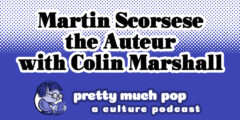Scorsese’s The Irishman in the Context of his Oeuvre–Pretty Much Pop: A Culture Podcast #29 Featuring Colin Marshall

What distinguishes the highly lauded 2019 film The Irishman within director Martin Scorsese's body of work? Frequent Open Culture contributor Colin Marshall joins Mark Linsenmayer, Erica Spyres, and Brian Hirt to talk about what we do and don't connect with in Scorsese's work and how these films qualify as "art films" despite their watchability, not to mention the big budgets and stars.
We cover CGI age alteration, the connection to The Joker, his comments about the Marvel franchise vs. him being a franchise unto himself, his use of music, and making films as an old guy. We hit particularly on Raging Bull, Taxi Driver, Bringing out the Dead, The King of Comedy, Goodfellas, Gangs of New York, The Departed, Casino, Silence, and Cape Fear. (There are no significant spoilers about any of these other films, just The Irishman.)
Beyond just watching or re-watching a lot of films, here are some articles we used to prep:
- "Explore the Films of Martin Scorsese" by Zach Hollwedel
- "A Guide to Watching Scorsese Movies Like an Insider" by Ben Keningsberg
- "Martin Scorsese Is Letting Go" by Dave Itzkoff
- "How To Watch The Irishman (As A Miniseries)" by Luke Parker
- "Scorsese’s ‘The Irishman’ Is a Big Lie. Here’s What Really Happened to Jimmy Hoffa" by Vince Wade
- "The Irishman: The Inconvenient Truth About the Movie’s Central Confession" by Julie MIller
- "Netflix’s Limited ‘The Irishman’ Release Is a ‘Disgrace,’ Head of Movie Theater Group Says" by Beatrice Verhoeven
- "Martin Scorsese Does Not Recommend Watching ‘The Irishman’ on a Phone: ‘A Big iPad, Maybe’" by Erin Nyren
- "The Irishman Shows The Limits of CGI Deaging" by Adrienne Tyler
- "The De-Aging In ‘The Irishman’ May Make You A Believer In This Controversial Tech" by Jasmine Ting
Colin recommends the books Easy Riders, Raging Bulls, Scorsese on Scorsese, and Gangster Priest: The Italian American Cinema of Martin Scorsese. Read Colin's Open Culture articles on Scorsese. Also, Colin reviews The Partially Examined Life in 2012.
Here's that clip from Singles about "the next Martin Scorseeze." Here's Peter Boyle in Taxi Driver giving "Wizard" advice. Watch Abed in Community consider whether Nicolas Cage is good or bad.
This episode includes bonus discussion that you can only hear by supporting the podcast at patreon.com/prettymuchpop. This podcast is part of the Partially Examined Life podcast network.
Pretty Much Pop: A Culture Podcast is the first podcast curated by Open Culture. Browse all Pretty Much Pop posts or start with the first episode.
Scorsese’s The Irishman in the Context of his Oeuvre–Pretty Much Pop: A Culture Podcast #29 Featuring Colin Marshall is a post from: Open Culture. Follow us on Facebook, Twitter, and Google Plus, or get our Daily Email. And don't miss our big collections of Free Online Courses, Free Online Movies, Free eBooks, Free Audio Books, Free Foreign Language Lessons, and MOOCs.
from Open Culture https://ift.tt/37EcNQ9
via Ilumina
Comments
Post a Comment